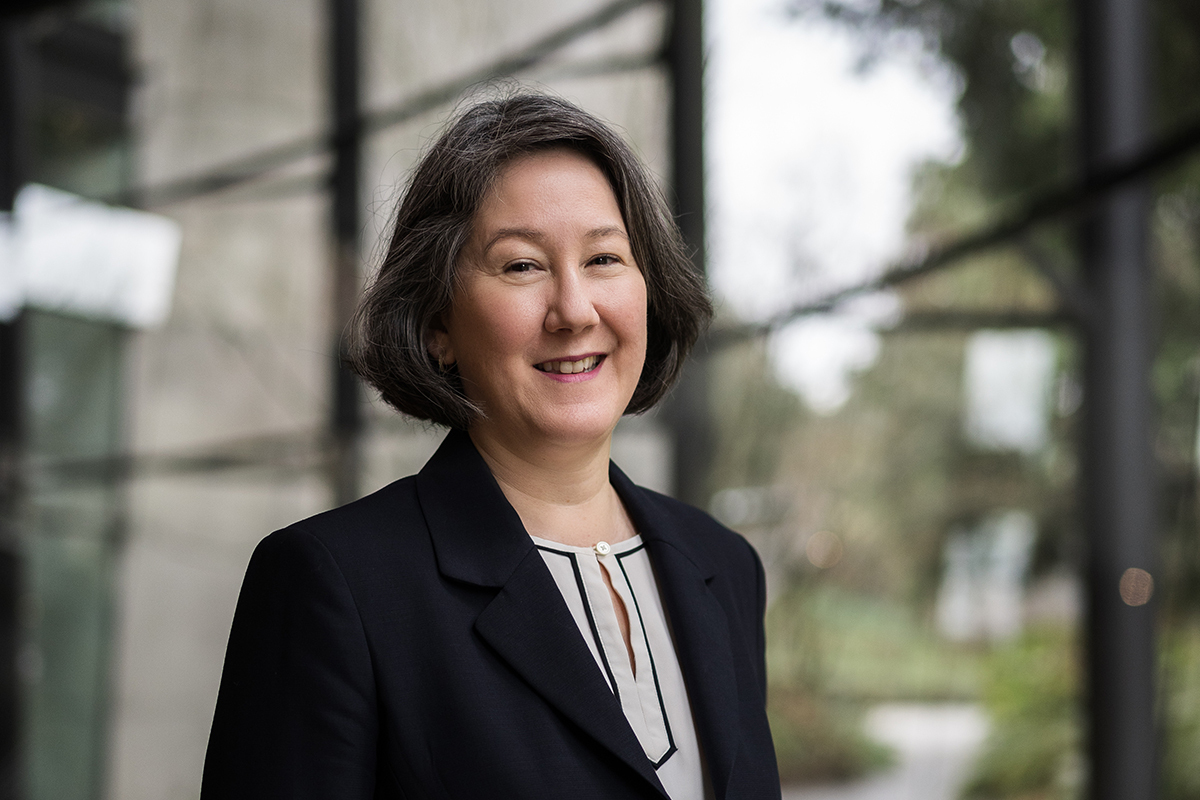

Dr. Clare Haru Crowston, Dean of Arts
In January 2023, Dr. Clare Haru Crowston began a five-year term as the new UBC Dean of Arts.
Dr. Crowston is an accomplished academic whose research interests lie in the early modern history of women and gender, and of working people in early modern France. Prior to joining UBC, she served as the Associate Dean for the Humanities and Interdisciplinary Programs in the College of Liberal Arts and Sciences at the University of Illinois at Urbana-Champaign.
We spoke to Dr. Crowston about her research background, what drew her to the UBC Faculty of Arts, and what she is most looking forward to in her first few months as Dean.
What drew you to apply for the Dean of Arts position at UBC?
This is a dream job for me for a number of different reasons. One of the greatest attractions of the position was the breadth and depth of scholarship and creativity in the Faculty of Arts. The opportunity to interact with world-renowned scholars and practitioners from across the social sciences, humanities, and creative and performing arts was an irresistible draw.
I was also attracted to UBC and the Faculty of Arts because of its commitments to building a more just and inclusive university. Across the North American higher education landscape, UBC stands out as an institution that has made great strides in thinking about and enacting transformational policies and practices, as reflected in the Indigenous Strategic Plan and the Inclusive Action Plan. Equity, diversity and inclusion are crucial priorities for me, so I welcome the opportunity to join an institution that resonates so well with my values.
UBC’s location was the final icing on the cake. Not only is the city spectacularly beautiful and a hub for global innovation, it also happens to be where my parents live. So in some ways – although I’ve never lived in Vancouver – it feels like coming home.
What are you looking forward to most about your new role?
I am most looking forward to meeting students, faculty, staff and the broader Arts community, and learning about all the exciting projects they have underway. My schedule this month includes meeting with Arts undergraduate students, a student production at the Chan Centre and an exhibition opening at the Belkin, among other events. I have also embarked on a tour of academic departments, schools and institutes that will take me across the Faculty of Arts this spring. I am very much looking forward to the conversations I’ll be having with people from many different programs and units in the coming weeks.
What message would you like to share with Arts students?
I know students have faced, and continue to face, significant challenges, ranging from the impact of Covid, to inflation, to climate change and military conflicts across the globe. With a daughter in university and two sons finishing high school, I have seen first-hand how students have been affected by these issues. As Dean, the well-being and success of students is one of my main concerns and I will work closely with our great team of advisors, faculty and other colleagues to ensure students have the resources and support they need to succeed.
I would also share my gratitude to our students for choosing to study in the UBC Faculty of Arts and my tremendous enthusiasm for everything they are going to accomplish during their time here. In the short time I’ve been at UBC, I’ve been overwhelmed by the range and quality of what is on offer here. There is truly something for everyone and I encourage students to explore all the possibilities around them.
Can you tell us about your research background and why you chose to pursue history?
I was drawn to history as a high school student in Toronto, thanks to the enthusiasm and skill of my fantastic teachers. What I love about research and writing history is that it combines creativity and imagination with the rigors of evidence and empirical investigation. My research focuses on the history of early modern France, with particular interests in the history of labor, women and gender, material culture, economic exchange, and fashion. Since my time as a graduate student, I have been fascinated by the ties binding together realms of human experience and history that are often segregated by disciplinary divisions. My research has been devoted to looking beyond these divides and on reconstructing the mutual interconnection of society, culture, economics, and politics.
I have also been committed to studying the lives of ordinary people, especially women, and to viewing them not only as makers of the range of commodities that resulted in an eighteenth-century “consumer revolution”, but as makers of new social relations, cultural representations, political economies, and state formations. My work argues that it is impossible to understand the momentous changes that forged the modern world without attending to the labor of ordinary people in all its dimensions. Learning how seemingly powerless and marginalized people changed history gives me hope for our challenging times.
What inspires you to lead?
Like many academic administrators, I remain in many ways a scholar and a teacher at heart. Because I cherish my identity as a historian – someone who creates knowledge about the past and shares it with others – the choice to spend most of my time doing something else did not come easily. I chose to take on leadership positions, first as chair of a History department, then as an associate dean, and now as dean, out of a desire to serve the communities to which I belonged.
As I moved through the ranks as a faculty member, I came to believe that I could and should use my experience and status to make things better for other people and to help my institution make a positive difference. My research has taught me a great deal about how institutions function, how they create and reinforce unequal power dynamics and how they change – or do not change – over time. My goal as an academic leader is to draw on this knowledge to help steer the university toward a more equitable and just future.
Of course, I do not do this alone, but alongside dedicated and brilliant colleagues, students, and community partners, whose expertise and passion for these issues serve as an inspiration and role model. My role is to convene and support these experts and to create structures to recognize and reward their labor. Together, we can open doors to people, ideas, and forms of collaboration that have not previously been central to the university.
Meet the Dean
- On Feb 25, Dr. Clare Haru Crowston will deliver a talk entitled “The Critical University: Place as Past, Present and Future.” The talk takes place at P. A. Woodward Instructional Resources Centre (2194 Health Sciences Mall, Vancouver) in Hall # 2. Free, no RSVP required.


